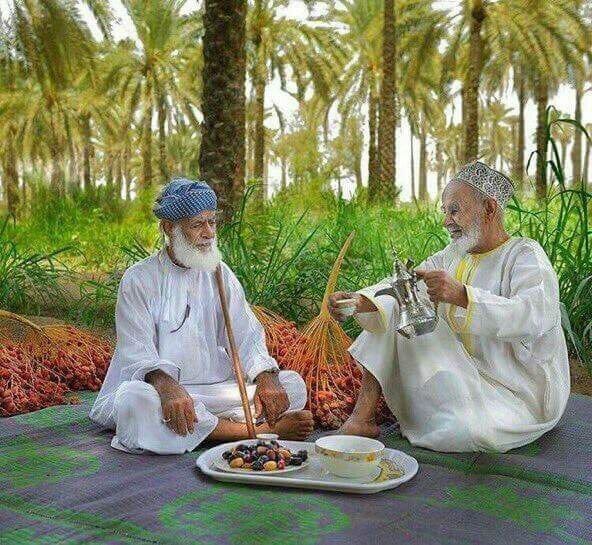
The analysis of date palm production and processing in the United Arab Emirates examines the agricultural, economic, and industrial aspects of this important product, including methods of cultivation, harvesting, processing, and export.
Date Palm Cultivation Areas in the UAE
Date palm cultivation in the UAE is concentrated in the following regions:
A) Abu Dhabi
Although there are limitations on expanding palm plantations in this emirate due to soil salinity and water shortages, Abu Dhabi hosts the largest plantation development programs. Using the latest agricultural techniques and modern irrigation systems, existing plantations have been rehabilitated, restored, and even expanded. These developments rely on superior local varieties or imported varieties from neighboring Gulf countries and Iraq. Some plantations in this emirate contain over 5,000 date palms, employing the latest methods in planting, maintenance, harvesting, and packaging.
B) Dubai
There are no significant constraints on expanding date palm cultivation in Dubai, as the region's climate and soil conditions are favorable. Modern plantations have also been established in this area.
C) Ajman
Studies have explored the use of treated wastewater from urban water treatment plants for expanding palm plantations in this emirate.
D) Umm Al Quwain
The date palm plantations in this emirate still rely on traditional irrigation systems, which presents a primary limitation to further expansion.
E) Sharjah
Due to water scarcity, practical solutions for water conservation and finding alternatives to groundwater resources are critical, as the declining quality and availability of water are ongoing challenges.
Despite the recent establishment of modern plantations in many emirates, some still maintain traditional date palm groves with older varieties. The major limitations to expanding date palm cultivation in the UAE include soil salinity and water shortages. In response, the government has focused on addressing water scarcity through the development of modern irrigation methods, including the use of treated wastewater for irrigating date palm plantations. Modern irrigation programs have increased irrigation efficiency to 80–85%.
Date Varieties in the UAE
The UAE is home to approximately 130 varieties of dates. The government has prioritized identifying and promoting nine market-preferred varieties, which are cultivated in modern plantations. These varieties include:
- Khalas (medium-sized, similar to Piarom),
- Jabri,
- Barhi,
- Lulu,
- Hilali,
- Fardh,
- Khneizi,
- Bou Ma'an, and
- Sultana.
Government Programs to Support Date Production and Supply
The UAE has implemented various initiatives to support the production of high-quality dates. Agricultural policies are based on the following principles:
- Expanding date palm cultivation using modern tissue culture techniques.
- Integrated pest management for date palms.
- Researching pesticides and their effects on dates.
- Conserving water resources and managing irrigation in plantations.
- Developing integrated programs for date breeding, production, and maintenance.
- Surveying the number of date palms nationwide.
- Expanding the cultivation of superior varieties, particularly through tissue culture.
- Training skilled farmers to implement mechanization in plantations to address labor shortages.
- Promoting dates as part of tourism development programs through advertising to tourists, traditional packaging, palm-based handicrafts, and traditional date-based foods.
- Enforcing existing regulations and drafting new laws to protect date palm trees.
- Organizing promotional activities to support agricultural operations at the state level.
- Strengthening research collaborations between universities, the Ministry of Agriculture, environmental organizations, and local research institutions to address production challenges, improve efficiency, identify the water requirements of new varieties, and enhance fruit quality.
- Reducing post-harvest losses of dates.
- Supporting the expansion of the date processing industry, including packaging and utilizing palm by-products for raw material production.
Date Processing Industries in the UAE
Investment in the date processing industry began in the 1990s. The government actively sought to attract investment in date-related industries. Date processing factories in the UAE typically include grading, washing, and packaging lines, as well as production lines for date paste and pitted or stuffed dates. However, some factories still operate with low efficiency.
The UAE has seven primary date processing factories. Notably, packaged dates are regarded as a "national and local gift." The sale of dates to tourists in airport duty-free shops has significantly increased. Factories produce various packaging styles that reflect Arab culture, catering to both local and international markets.
Key Date Processing Factories in the UAE
1. Al-Saad Factory (Public Sector)
- Established: 2005
- Products: Packaged dates, paste, syrup, date bars, chocolate-covered dates, organic dates.
- Capacity: One of the largest and most modern integrated date factories globally.
- Affiliation: A subsidiary of Al-Foah, which was part of the Senaat Holding until 2021 and is now under Agthia, also a Senaat company.
- Operations: Contracts with 18,000 Emirati farmers, operates eight collection centers handling 113,000 tons of dates annually via 60,000 truckloads, and exports to 48 countries.
- Certifications: Holds numerous health certifications.
- Investment: Approximately $45 million.
2. Al-Mirfa Factory (Public Sector)
- Established: 1994
- Products: Packaged dates.
- Affiliation: Also a subsidiary of Al-Foah.
3. Al-Ain Factory (Private Sector)
- Established: 1986
- Products: Various packaged dates, syrup, paste, molasses, and animal feed.
- Capacity: 500 tons annually.
- Purpose: Primarily processes surplus dates from traditional and modern plantations.